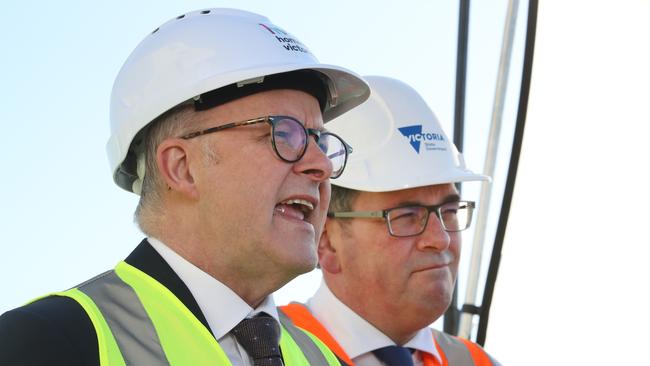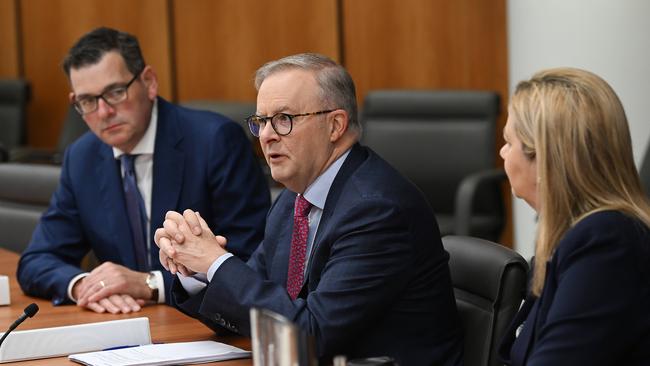National cabinet: Scramble for key to unlock housing fix
National cabinet will unveil a new housing crisis response on Wednesday, amid grim new homebuilding forecasts and a surge in construction firms going bust.

Removing investment barriers for super funds, streamlining planning restrictions, providing incentives for projects and strengthening renters’ rights will underpin national cabinet’s housing strategy, amid grim new building forecasts and a surge in construction firms going bust.
Federal, state and local governments on Wednesday will commit to turbocharging the national housing accord to help reverse soaring building costs and spiralling rents that threaten more rate pain unless supply is urgently brought forward.
A two-hour national cabinet meeting in Brisbane will consider new rent controls, including limiting rent increases to once a year and banning no-fault evictions, but won’t endorse Greens’ demands for a rent freeze.
The national housing crisis response follows fresh warnings from the Reserve Bank about a spike in construction firm insolvencies, as well as higher prices and rents driven by building costs, lack of supply and migration.
Australian Bureau of Statistics wage price index data released on Tuesday revealed a surprise fall in wages growth in the year to June, which adds to the case for the RBA to keep rates on hold as workers suffer deep real pay cuts.
With the volume of land transactions falling to about a third of pre-pandemic levels and prices increasing by more than 200 per cent over the decade, new Housing Industry Association data obtained by The Australian warns that home-building activity is set to slow to its lowest level in more than a decade.
The HIA outlook report says new home construction will fall to just 95,370 in 2024, the lowest since 2012, with multi-unit projects, which hit a decade low last year, estimated to reach 69,680 this year.

Insolvencies in the building industry have also soared to their highest level in at least a decade, according to analysis of Australian Securities & Investments Commission data.
More than 2200 construction firms went under in the 2022-23 financial year, 70 per cent more than in 2021-22. That compared with an annual average of 1570 builder insolvencies over the six years leading into the pandemic, and well above the previous recorded peak of 1800 insolvencies in 2013-14.
Speaking ahead of a federal cabinet meeting in Brisbane on Tuesday night, Anthony Albanese said housing affordability and supply were “very much front and centre on the agenda” for national cabinet.
The Prime Minister said the stalled $10bn Housing Australia Future Fund and national housing accord, which pledges to build one million new well-located homes over five years from 2024, were crucial to unlocking supply and easing pressure on the housing market.
Mr Albanese said other measures, including the $2bn social housing accelerator fund, build-to-rent incentives for the private sector to deliver rental housing and the biggest increase in rental assistance in 30 years would “assist people to help lift the cost-of-living pressures which are there by increasing housing supply”.

“Every premier and chief minister as well as the commonwealth gets it,” Mr Albanese said.
“And we’re all on the same page. We all know that housing supply is the key. We all know as well that … renters need more rights, but it can’t be done in a way that actually dampens housing supply.”
Victorian Premier Daniel Andrews said that without greater housing supply, “those cost-of-living pressures that are such a factor for so many of us will continue to be a really big challenge”.
NSW Premier Chris Minns said tackling the housing crisis would involve “a whole-of-community approach, involving industry and every level of government”. “Ambitious targets are welcome, but this will require a strong federal-state partnership to deliver them,” Mr Minns said.
RBA governor Philip Lowe last week warned that all levels of government must reform land zoning to boost housing supply and avoid short-term policy interventions, including rent controls and first-home grants.

HIA deputy managing director Jocelyn Martin said rent caps and freezes were “treating the symptom and not the cause”.
“We all feel for people trying to find places to rent or to afford rentals,” Ms Martin said. “It’s a product of there not being places to rent. That’s what pushes prices up … it’s the fact there simply is not enough supply.
“Build-to-rent with super funds, planning barriers, housing accords, the Housing Australia Future Fund are all parts that are needed to address overall supply. It’s not one thing. It’s about bringing those pieces together.”
Ms Martin said multi-building and multi-apartment developments took a long time and super funds were hesitant about risk and return. “Build-to-rent is a reasonably risky model because you can’t sell it in advance,” she said. “It’s a significant investment decision for an institution like a super fund or any developer.
“Rezoning and infill options are also welcomed. That requires a different approach to development and local and state governments managing NIMBYism. The housing accord is an effort to bring all those layers of government into lock-step.”

Despite hopes the national housing strategy will douse concerns over the HAFF, the CFMEU and Greens are planning protests at the ALP national conference in Brisbane. More than 2000 members and supporters of the union, which wants the government to impose a 40 per cent super profits tax on companies with turnovers above $100m to build almost one million homes, will protest outside the Brisbane Convention Centre on Thursday.
Greens housing spokesman Max Chandler-Mather said rent reforms considered by national cabinet were “unambitious” and left renters exposed to unlimited rent increases and unfair eviction.
Council of Small Business Organisations Australia chief executive Luke Achterstraat said Mr Albanese’s push for a public holiday if the Matildas won the World Cup, to be discussed by national cabinet, was inappropriate given the housing crisis. “Many builders who are small businesses will find it challenging to operate due to noise restrictions imposed by a public holiday,” Mr Achterstraat said. “This is the last thing small business needs and the last thing we need in the middle of a housing crisis with the urgent need for more housing supply.”
The Councils of Social Service network, which is pushing for a limit on rent increases and a ban on no-grounds evictions, wrote to national cabinet leaders warning of “distressing levels of housing need with a devastating human impact”.







To join the conversation, please log in. Don't have an account? Register
Join the conversation, you are commenting as Logout